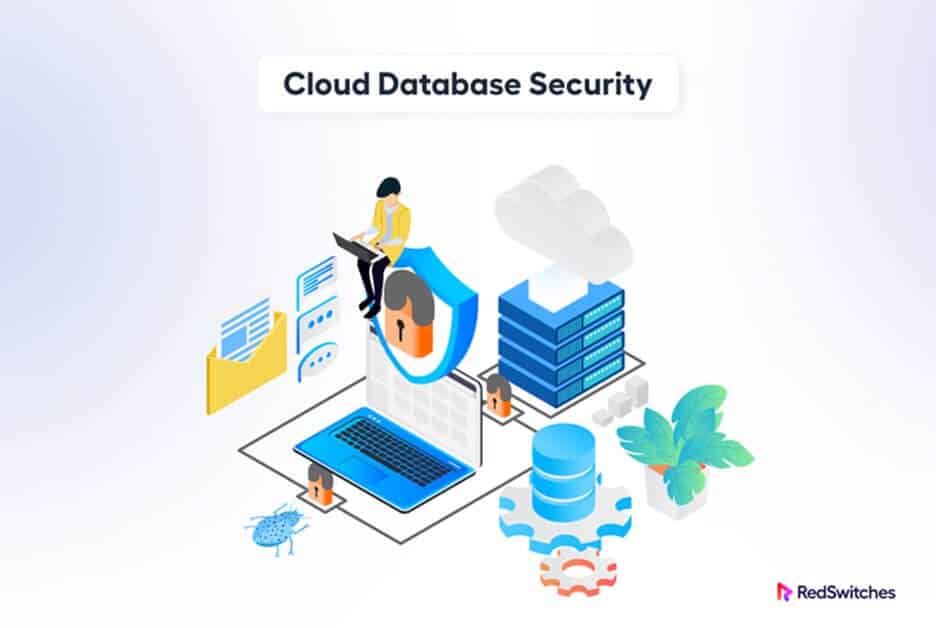If you care to find out, you will discover that many more organizations are choosing cloud databases. Statistics show that 83% of enterprise workloads are now on the cloud. While the number is impressive, do users understand the risks of cloud-based storage and the need for cloud database security?
Cloud databases have several advantages, from worldwide accessibility to flexible usage systems. However, enterprises in the cloud need first to recognize the risks associated with cloud databases. This awareness will increase their preparedness to avert such threats. It will shift users’ focus from merely employing the services of a hosting company to active participation in the security process.
Security in cloud databases is a topic critical to your company’s protection. While cloud service providers offer essential security tools, security is a shared responsibility between you and your service provider. In this article, you will identify the common threats of cloud databases and how to mitigate them.
Table of Content
- What is Cloud Database Security?
- What are the Types of Cloud Database Security?
- Why is Cloud Database Security Used?
- What Are Some Common Threats to Cloud Databases?
- What are some Common Ways to Reduce Risk in Cloud Databases?
- Choose a Cloud Hosting Provider with Cloud Security
- Why is Cloud Database Security Important?
- Key Takeaways
- FAQs
What is Cloud Database Security?
Cloud database security is a set of processes and measures that protect cloud-based storage against intentional or accidental threats. A cloud database collects data, infrastructure, and applications in a cloud computing platform. It could be a public, private, or hybrid cloud environment. Notwithstanding the type of environment, cloud databases are prone to risks like breaches, loss, or malware. This is why securing the cloud is essential.
Security measures help safeguard data, database management, and other cloud applications. It also ensures that you comply with cloud regulations by authorities in your State of operation. You can protect your cloud databases via user authentication, access control, and building firewalls.
What are the Types of Cloud Database Security?
We would classify cloud database security into different layers. Each layer has a significant effect and must work together with other layers for maximum security.
Layer 1: Network security
The first line of action is to build firewalls. A firewall is a network security that examines and filters incoming and outgoing network traffic within a private network. It could be a software, hardware, or cloud firewall that prevents unauthorized access to your network. Firewalls also conduct assessments to detect suspicious activities.
Layer 2: Access management
Next in line is the control of users with access to your network. Authentication ensures that each user has an identity and can prove so with a password. On the other hand, authorization allows such users to access and perform restricted operations on company data.
Layer 3: Threat protection
The third layer has to do with detecting and protecting against threats. It requires that you monitor database activities to detect anomalies and potential threats.
Layer 4: Information protection
Data encryption, backup, and disaster recovery plans are measures for information protection. Through encryption, you encode sensitive data that only authorized users can decipher. With a disaster recovery plan, you can backup and restore the database in the event of loss. You can add an extra layer when implementing physical security to limit human access to the cloud servers.
Link : Media iStock
Why is Cloud Database Security Used?
Several companies are still skeptical about moving to the cloud because of the many threats associated with cloud computing. IT professionals use database and cloud security to stay ahead of these threats. They also use it to protect sensitive data and the company’s intellectual property. Some other reasons for database security include:
To Maintain Customer Trust: Customers hesitate to associate with such a company when it gets the news that a particular company has experienced a data breach. Database security helps to improve an organization’s reputation and to attract more customers. When customers know you safeguard their information, it increases your competitive advantage.
To Prevent Revenue Loss: In the event of a data breach, the business may have to halt operations until threats are resolved. This causes a decline in revenue generation. It can also cause the company to disburse unexpected expenses for recovery processes. Database security helps to prevent all of this.
To Meet Compliance Requirements: National agencies impose specific data protection laws and regulations. Violation of such laws may lead to a penalty in the form of massive fines or suspension.
What Are Some Common Threats to Cloud Databases?
Many enterprises, about 44%, deal with over 100 terabytes today. Such a database is safe when there is database cloud security in place. However, your organization is at risk of the following threats without resilient security measures.
Data Breaches
Cybercriminals know that several organizations utilize large data volumes. They also see a data breach as inevitable without proper management skills. So if your cloud database is not secured, attackers can infiltrate and steal data for selfish interests.
Account Hijacking
When cybercriminals can exploit your database vulnerability, they can steal login credentials. Then, they can hijack your accounts by changing these credentials, blocking the users out. These attackers may expose company files or bring on more unauthorized users.
Data Loss
Even though Amazon promises SLAs of 99.99 percent availability, what happens when there’s a crash where your data is stored? If you save all company files on a single cloud-based server, you lose all of them in the event of a crash. Also, attackers can erase sensitive files if they steal your credentials.
Exposed APIs
Statistics show that 16% of companies experienced daily attacks on their Application Programming Interface, APIs. As a cloud-based company, you could employ the services of other cloud vendors with exposed APIs. These misconfigured APIs can affect data integrity and cause downtime in worst-case scenarios. They also open the door for attackers to manipulate database contents. So it is essential to protect your database with security measures like rate limits and data transfer encryption.
Malware
Cloud servers could also be a clear ground for malware attacks. Cybercriminals can reconfigure databases for storage and transfer into a virus distribution platform.
Link : Media iStock
What are some Common Ways to Reduce Risk in Cloud Databases?
Secure the network data
Secure your network data by limiting each user’s access. Specify the extent of information each user can access, preventing exposure to other sensitive data. One example of this selective access occurs when a user can have a partial view of some files or a few digits out of the whole.
Understand the network data
An understanding of your network data will keep you strong against cloud risks. What is our sensitive data? Where do we store them? Which users can access public and sensitive files? These questions will increase your understanding of your network. Then, you can review access regularly and determine areas of significant risk.
Monitor the network data
Effective monitoring involves taking logs, conducting regular security tests, and frequent security audits. There should be a security team that stays proactive, ready to combat any threat that may arise. The security team should also learn the operations of cybercriminals to defend the network at all times.
Utilize Security Intelligence Technologies
Another way to reduce risk is using cloud database security techniques like Security Intelligence and Event Management (SIEM) technology. IT professionals use this technology to identify weak areas in the company’s firewalls and defense systems. The technologies also analyze data performance and can identify potential risks in real time.
Choose a Cloud Hosting Provider with Cloud Security
The extent of risk exposure in your organization depends mainly on your hosting provider. If you use a private cloud, your organization controls IT security issues. Your security team should be well-equipped with cloud security. Similarly, your cloud provider is responsible for protection if you use a public cloud. So, ensure you ascertain the provider’s security prowess before signing up with them.
Why is Cloud Database Security Important?
Simply put database security in the cloud database protects your company’s sensitive data. It prevents data breaches and costs of fixing, including legal fees, system restoration, victim compensation, and fines for non-compliance. It also protects you against hijackers who demand ransomware for locked files and data.
Key Takeaways
Cloud database storage is growing at a rate of 60%. As it grows, current and future organizations should prioritize database security cloud computing. The threats and risks can be destructive, needing you to prevent them at all costs. Here are the points you should remember about database security.
- Cloud database security is a set of processes and measures that protect cloud-based storage against intentional or accidental threats.
- Cloud databases are of different types; network security, access management, threat protection, and information management.
- With cloud database security, you can maintain customer trust, prevent financial losses and ensure compliance with regulations.
- The common threats to databases in the cloud include data breaches, data loss, misconfigured APIs, and malware attacks.
- To reduce threat risks, you must understand, identify, monitor, and utilize intelligence technologies to monitor your company data.
If you need a cloud database security provider with the technology for maximum security, RedSwitches is your provider. Redswitches is a reputable cloud hosting company with database security that keeps your security at the edge.
FAQs
Q-1) How do you secure a database in the cloud?
Securing a database in the cloud involves a group of measures like encryption, firewalls, and a security group that monitors your cloud database.
Q-2) What are the three categories of database security?
The three types of database security are the cloud database, access, and user security.
Q-3) What are cloud security services?
Cloud security services are a collection of processes, technologies, policies, and controls that protect cloud databases from internal and external threats.
Q-4) How secure are cloud databases?
While cloud databases are secure but prone to risks, including data breaches, hijacks, and data loss.
Q-5) Is cloud database SQL?
While SQL is a programming language, some SQL utilize cloud databases for operation.
Q-6) Why is a cloud database so powerful?
Cloud databases are powerful as they conveniently accommodate growing data volume without increasing infrastructure.



